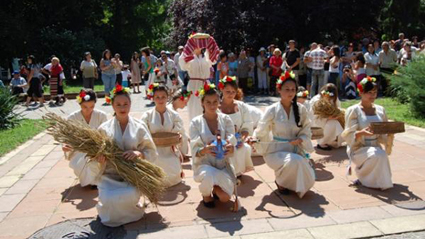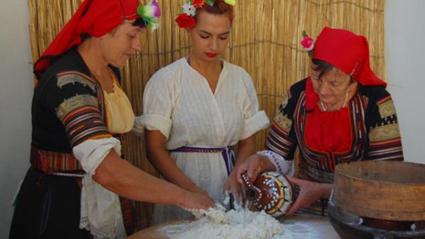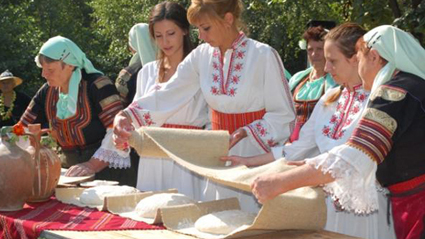While on Assumption Day thousands of Orthodox Christians and Catholics flock to church to pray, people in Kyustendil honour Panagia – another name for the Virgin Mary. Panagia is the name given to the ritual raising and breaking of bread. Panagia is a pendant depicting the Virgin Mary, it is also a name given to churches, fortresses and towns.
 Panagia brings religious and folklore tradition in one. The ritual is performed in churches and chapels bearing the name of the Mother of God. One day before the religious fete, girls clad in national costume, sickles in hand bring in the ears of wheat, singing harvest songs. Women make loaves the way their grandmothers once did – they start before sunup, use crystal clear water from the well and bake them in their farmhouse ovens. Rituals connected with bread very much resemble the Holy Sacrament – the wheat is thurified and the woman, the embodiment of the mother passes her “knowledge” over to the girls.
Panagia brings religious and folklore tradition in one. The ritual is performed in churches and chapels bearing the name of the Mother of God. One day before the religious fete, girls clad in national costume, sickles in hand bring in the ears of wheat, singing harvest songs. Women make loaves the way their grandmothers once did – they start before sunup, use crystal clear water from the well and bake them in their farmhouse ovens. Rituals connected with bread very much resemble the Holy Sacrament – the wheat is thurified and the woman, the embodiment of the mother passes her “knowledge” over to the girls.
 The ritual of kneading Assumption Day bread will this year be performed in Piperkov Chiflik village. And in the area around the St. Ivan of Rila church, the women will be teaching young girls how to make bread as it was once made. The loaves will be baked in a flat clay baking dish called podnitsa as this has been done since time immemorial and will then be put on display in front of the Assumption church in Kyustendil. It is there that Panagia – the ritual raising of bread will be performed.
The ritual of kneading Assumption Day bread will this year be performed in Piperkov Chiflik village. And in the area around the St. Ivan of Rila church, the women will be teaching young girls how to make bread as it was once made. The loaves will be baked in a flat clay baking dish called podnitsa as this has been done since time immemorial and will then be put on display in front of the Assumption church in Kyustendil. It is there that Panagia – the ritual raising of bread will be performed.
 “The bread baked on feast days is different,” says Lyubliana Nacheva, expert at the Culture and Spiritual Development department at Kyustendil municipality. “Of course, the things that go into its making are no different – flour, leaven, water, salt. What is more important, however, are the semantics people used to imbue bread with. The process of making feast-day bread is connected with spiritual purification, with the prayer the mother says before starting, with the lighting of candles, with the thurification. And it all starts with the blessing of the water, the sign of the cross. This is done on Assumption Day, at Easter and Christmas, on St. George’s Day and other Christian holidays.”
“The bread baked on feast days is different,” says Lyubliana Nacheva, expert at the Culture and Spiritual Development department at Kyustendil municipality. “Of course, the things that go into its making are no different – flour, leaven, water, salt. What is more important, however, are the semantics people used to imbue bread with. The process of making feast-day bread is connected with spiritual purification, with the prayer the mother says before starting, with the lighting of candles, with the thurification. And it all starts with the blessing of the water, the sign of the cross. This is done on Assumption Day, at Easter and Christmas, on St. George’s Day and other Christian holidays.”
Kneading the feast-day bread begins with a prayer for good will, it is then decorated with ornaments made of dough depicting different important aspects of life and is then taken to church in gratitude to the Virgin Mary.
“Making bread for Assumption Day is typical of Kyustendil, all the more so that the church there bears the name of the Holy Mother of God,” says Lyubliana Nacheva. “On this day people bring their own bread to be thurified at a church service for each family and each individual. As to the cultural forum called Panagia it was created eight years ago. The idea is to show what Christian culture is all about, to demonstrate the authentic way of life and ethnography.”
English version: Milena Daynova
Photos: kultura-kn.infoClocks and bells will ring out in the center of Stara Zagora on Saturday, when the city will host the XXIV Masquerade Games Festival . The event will start with a traditional parade of participants. Attractive babugers, araps, old men and other..
Today marks the 88th anniversary of the birth of remarkable Bulgaria folk singer Nadka Karadzhova . Born on March 14, 1937 in the then Pazardzhik village of Trivoditsi (today - Plovdiv region), she is a descendant of an old musical family. At the age..
Every year, the chitalishte (community culture club) in the village of Kralevo not far from Targovishte, re-enacts Bulgarian traditions and rituals, organizing contests such as “Master lyutenitsa - maker” and “From granny’s dresser”. And for the..

+359 2 9336 661
